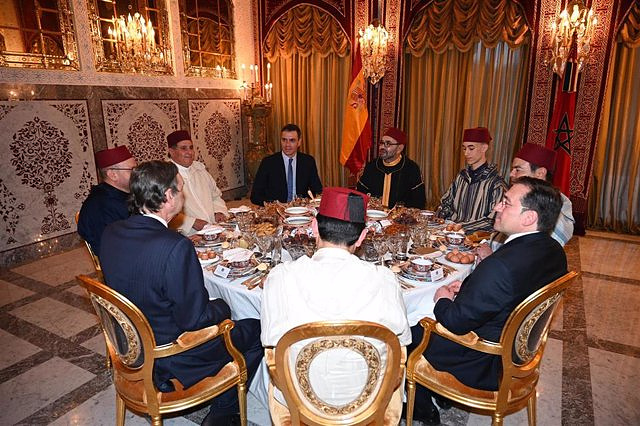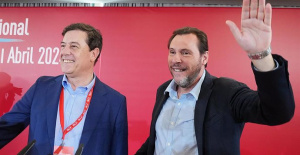The press of both countries replicates the statements by Sánchez and Feijóo on the bilateral relationship and the Sahara
MADRID, 2 Jul. (EUROPA PRESS) -
The declarations of the main leaders of PSOE and PP in view of the elections on July 23 have two very interested foreign spectators: Morocco and Algeria. In both countries, everything that is said about them and about the future of diplomatic relations is closely followed because of how it may affect them.
Both the Moroccan and Algerian press always closely follow what is happening in Spain and what has to do with their interests, especially as a result of the diplomatic crisis experienced between Madrid and Rabat, later overcome with the turn with respect to the Sahara and the support for the Moroccan autonomy plan, which in turn triggered a crisis with Algiers.
In recent weeks, after the decision of the President of the Government, Pedro Sánchez, to advance the elections to July 23, the interest is even greater since in Morocco there is concern that an eventual victory of the PP will cause a retreat in support for the plan of autonomy for the Sahara as "the most solid, credible and realistic basis" for a solution, while in Algeria it would be viewed with good eyes if this happened.
Neither the Moroccan nor the Algerian government have spoken in public about the appointment with the polls in Spain and about how its eventual result could benefit or harm them, something common in diplomacy, since the opposite could be seen as interference in a matter which is internal.
However, the press of both countries constantly echoes everything that has to do with Morocco and Algeria. In the case of the Alaouite press, particularly if it is in favor of its interests and its position regarding the Moroccanness of the Sahara or against its archenemy Algeria, and in the case of the Algerian one if it is to put Morocco in a bad light or points to a change from the current frozen relations.
Thus, everything that Sánchez and his Foreign Minister, José Manuel Albares, say, on the one hand, and what the leader of the PP, Alberto Núñez Feijóo, and other senior officials of his party, on the other, are looked at with a magnifying glass in particular. , with respect to what is its position in regard to these two neighboring countries with which there are historical relations not exempt from ups and downs but which are strategic for Spain.
In this sense, the Moroccan press has not ignored the fact that Sánchez reaffirmed in his interview with Jordi Évole his decision to support the Moroccan autonomy plan for the Sahara, which he justified by the lack of progress to resolve a conflict that was dates back five decades, and his refusal to characterize Morocco as an absolutist monarchy.
Likewise, the Yabiladi portal has recalled that the Executive also discredited the second vice president and now candidate for Sumar, Yolanda Díaz, when she said that the Alaouite kingdom was a "dictatorship" a few months ago.
Precisely, the appointment of the diplomat Agustín Santos as 'number two' on the Sumar list for Madrid has also generated a lot of interest in the neighboring country, given the criticism that has been leveled against him for his supposed pro-Moroccan position from Saharawi organizations.
Thus, for example, the aforementioned outlet highlighted that after the "euphoria" over the fact that Díaz had chosen the Sahrawi activist Tesh Sidi as "number three", "disappointment" had come over the election of Santos, who was head of Cabinet of Foreign Minister Miguel Ángel Moratinos and the person in charge of managing the case of the Saharawi activist Aminetu Haidar, expelled by Morocco to Spain in 2009.
But since the Government's position is well known, and both from Moncloa and from Foreign Affairs they have strived at all times to value the benefits of the new stage in the relationship with Morocco that has brought with it a reduction in immigration and an increase of commerce, what is most interesting both in Rabat and in Algiers is what is said from the PP.
In this sense, several Algerian media have collected in recent weeks a video taken from the interview that Ana Pastor did in El Objetivo with the leader of the PP in September 2022. In it, Feijóo assured that if he were president, the first thing he would do would be to try restore relations with Algeria.
Also, for example, the newspaper 'Echourouk', placed special emphasis on the rejection expressed by the opposition leader regarding Sánchez's turn on the Sahara for breaking with the traditional position of Spain and that motivated the crisis with Algeria, which in June 2022 suspended the Friendship Treaty, and also noted that among the names that sounded like Foreign Minister if the PP wins is Esteban González Pons, "a person very close to Algeria."
Meanwhile, in Morocco, they are trying to read between the lines in Feijóo's statements regarding the position he will adopt regarding the Sahara and whether there will be a reversal of what Sánchez decided.
The leader of the PP has been shielding himself at all times when he has been asked about it in which he is unaware of the terms in which that position was adopted and the agreements that have been reached with Morocco since then, first in the meeting with King Mohamed VI on April 7, 2022 and then at the High Level Meeting (RAN) in February this year in Rabat.
That was his response in a recent interview on Cadena Ser, which was echoed by the local media. According to what he said, when he met with the Moroccan Prime Minister, Aziz Ajanuch, in May 2022 in Rotterdam, he asked him if he was going to maintain the agreements of the current government and he told him that he did not know what they were, so they did not continue talking about the matter. .

 Exploring Cardano: Inner Workings and Advantages of this Cryptocurrency
Exploring Cardano: Inner Workings and Advantages of this Cryptocurrency Seville.- Economy.- Innova.- STSA inaugurates its new painting and sealing hangar in San Pablo, for 18 million
Seville.- Economy.- Innova.- STSA inaugurates its new painting and sealing hangar in San Pablo, for 18 million Innova.- More than 300 volunteers join the Andalucía Compromiso Digital network in one month to facilitate access to ICT
Innova.- More than 300 volunteers join the Andalucía Compromiso Digital network in one month to facilitate access to ICT Innova.-AMP.- Ayesa acquires 51% of Sadiel, which will create new technological engineering products and expand markets
Innova.-AMP.- Ayesa acquires 51% of Sadiel, which will create new technological engineering products and expand markets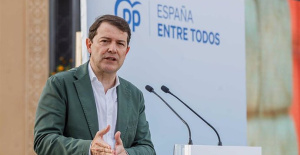 Mañueco emphasizes that Spain does not want "a president in hiding" and "surrounded by justice"
Mañueco emphasizes that Spain does not want "a president in hiding" and "surrounded by justice"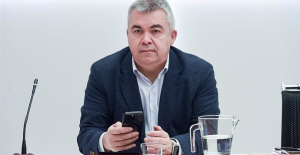 The 'number three' of the PSOE, Santos Cerdán, will appear this week in the Senate commission of the Koldo case
The 'number three' of the PSOE, Santos Cerdán, will appear this week in the Senate commission of the Koldo case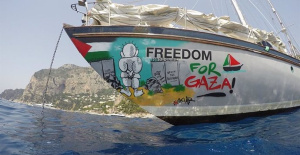 The 'Freedom Flotilla' denounces Israel's "sabotage" of its mission and asks for support and dissemination
The 'Freedom Flotilla' denounces Israel's "sabotage" of its mission and asks for support and dissemination 12M.- Díaz: "I ask Mr. Feijóo to stop laminating the politics of our country"
12M.- Díaz: "I ask Mr. Feijóo to stop laminating the politics of our country" How Blockchain in being used to shape the future
How Blockchain in being used to shape the future Not just BTC and ETH: Here Are Some More Interesting Coins Worth Focusing on
Not just BTC and ETH: Here Are Some More Interesting Coins Worth Focusing on UPV students build a prototype of a wooden house to move to Equatorial Guinea
UPV students build a prototype of a wooden house to move to Equatorial Guinea The UA opens the call for the Impulso 2024 Awards for the best innovative business initiatives
The UA opens the call for the Impulso 2024 Awards for the best innovative business initiatives ALI, virtual assistant from Alicante, internationally recognized by the OECD
ALI, virtual assistant from Alicante, internationally recognized by the OECD Retrópolis brings the golden age of video games and computing to the UPV
Retrópolis brings the golden age of video games and computing to the UPV A million people demonstrate in France against Macron's pension reform
A million people demonstrate in France against Macron's pension reform Russia launches several missiles against "critical infrastructure" in the city of Zaporizhia
Russia launches several missiles against "critical infrastructure" in the city of Zaporizhia A "procession" remembers the dead of the Calabria shipwreck as bodies continue to wash up on the shore
A "procession" remembers the dead of the Calabria shipwreck as bodies continue to wash up on the shore Prison sentences handed down for three prominent Hong Kong pro-democracy activists
Prison sentences handed down for three prominent Hong Kong pro-democracy activists ETH continues to leave trading platforms, Ethereum balance on exchanges lowest in 3 years
ETH continues to leave trading platforms, Ethereum balance on exchanges lowest in 3 years Investors invest $450 million in Consensys, Ethereum incubator now valued at $7 billion
Investors invest $450 million in Consensys, Ethereum incubator now valued at $7 billion Alchemy Integrates Ethereum L2 Product Starknet to Enhance Web3 Scalability at a Price 100x Lower Than L1 Fees
Alchemy Integrates Ethereum L2 Product Starknet to Enhance Web3 Scalability at a Price 100x Lower Than L1 Fees Mining Report: Bitcoin's Electricity Consumption Declines by 25% in Q1 2022
Mining Report: Bitcoin's Electricity Consumption Declines by 25% in Q1 2022 Oil-to-Bitcoin Mining Firm Crusoe Energy Systems Raised $505 Million
Oil-to-Bitcoin Mining Firm Crusoe Energy Systems Raised $505 Million Microbt reveals the latest Bitcoin mining rigs -- Machines produce up to 126 TH/s with custom 5nm chip design
Microbt reveals the latest Bitcoin mining rigs -- Machines produce up to 126 TH/s with custom 5nm chip design Bitcoin's Mining Difficulty Hits a Lifetime High, With More Than 90% of BTC Supply Issued
Bitcoin's Mining Difficulty Hits a Lifetime High, With More Than 90% of BTC Supply Issued The Biggest Movers are Near, EOS, and RUNE during Friday's Selloff
The Biggest Movers are Near, EOS, and RUNE during Friday's Selloff Global Markets Spooked by a Hawkish Fed and Covid, Stocks and Crypto Gain After Musk Buys Twitter
Global Markets Spooked by a Hawkish Fed and Covid, Stocks and Crypto Gain After Musk Buys Twitter Bitso to offset carbon emissions from the Trading Platform's ERC20, ETH, and BTC Transactions
Bitso to offset carbon emissions from the Trading Platform's ERC20, ETH, and BTC Transactions Draftkings Announces 2022 College Hoops NFT Selection for March Madness
Draftkings Announces 2022 College Hoops NFT Selection for March Madness